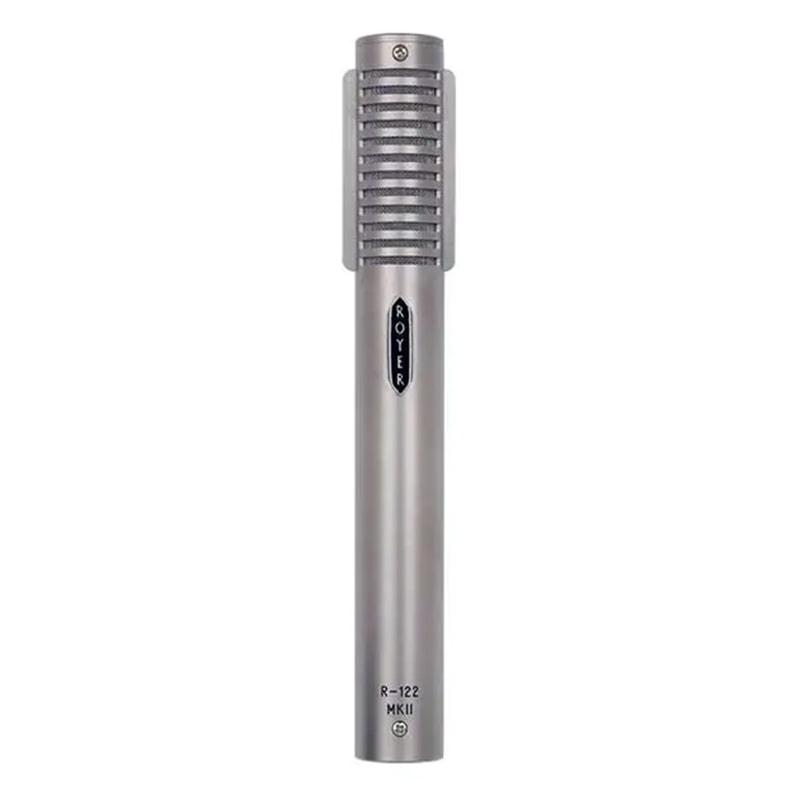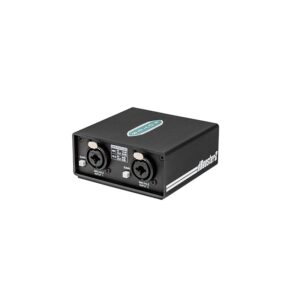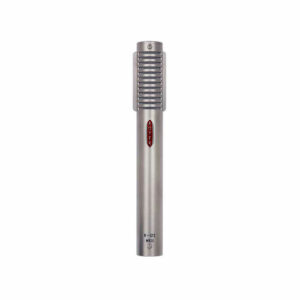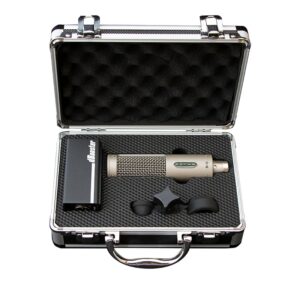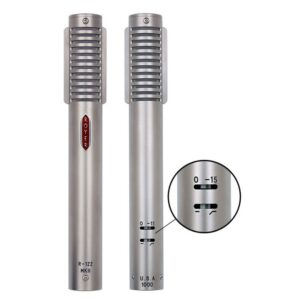Royer R-122 MKII Active Ribbon Microphone
Description
R-122 MKll Active Ribbon Microphone
In 2002 Royer introduced the R-122, the world’s first phantom-powered, active ribbon microphone. It was a revolutionary development in ribbon mics, combining impedance matching circuitry with condenser-like output levels that allowed the R-122 to be used on even the quietest sound sources. It also allowed the mic to be paired to virtually any preamplifier.
The R-122 MKll takes the R-122 to a whole new level, delivering unprecedented flexibility for ribbons via the addition of a switchable -15 dB pad and a switchable bass-cut filter. The switches are completely out of the circuit when disengaged so when both are off, the microphone is for all purposes an original R-122. The switches are located on the back of the microphone and recessed to prevent accidental activation.
The Pad
The R-122 MKll’s switchable -15 dB pad is positioned before the microphone’s electronics and, when engaged, eliminates any potential for headroom-related distortion on even the loudest sound sources. Wide-open electric guitars are no problem. With the pad in, the R-122 MKll’s output is actually 2 dB lower than Royer’s flagship R-121.
The R-122 MKll’s well-designed pad has no sonic imprint. Once levels are matched, the R-122 MKll reproduces sound exactly the same with the pad in as with the pad out.
The Bass Cut
When switched in, the R-122 MKll’s bass cut starts filtering at 100 Hz, 6 dB per octave, effectively reducing the mic’s bass buildup due to proximity effect. This smooth filter is extremely useful on vocals, many acoustic instruments, and close-miked electric guitars when less bottom end is desired.
The R-122 MKll’s electronics are hand-wired in Royer’s Burbank, CA factory. The microphone utilizes a special Royer-designed toroidal transformer that delivers a faster transient response than traditional ribbons, making it a first-call ribbon mic for drum overheads, percussion, and all acoustic instruments.
Gain
Conventional ribbon microphones need high-quality, high-gain microphone preamplifiers to record softer sound sources. The R-122 MKll’s output level is much higher, allowing you to use practically any mic preamplifier or board pre’s to record even the quietest sounds. The R-122 MKll contains a fully balanced, hand-wired, discrete head amplifier system utilizing a specially wound toroidal transformer and ultra-low noise FET’s. This system is extremely quiet and brings the R-122 MKll’s sensitivity to 37 dB, all while allowing for high SPL recording! Go ahead and plug a MKll into any preamp with average gain – you’ll get full Royer performance and enough level to drive any recording medium.
There is no increase in self-noise in the R-122 MKll’s higher sensitivity. All of the mic’s additional output comes from its large, specially wound toroidal transformer – that wonderful thing called “free gain.” The phantom powered circuitry provides impedance conversion only, adding no noise of its own.
Impedance Matching
The R-122 MK’s active electronics put a perfect load on the ribbon element at all times, allowing the microphone to deliver its full sonic potential regardless of the input characteristics of the following pre. Due to its low-impedance output, R-122’s can be used on extremely long cable runs with minimal signal loss. In addition, the ribbon element can’t be damaged by phantom power, miswired cables, or electrical glitches.
Patented Offset Ribbon Technology
The R-122’s proprietary offset ribbon transducer (Patent # 6,434,252) positions the ribbon element closer to the front (logo) side of the microphone. This configuration gives the ribbon more room to move within the prime magnetic field while maintaining full frequency response during high SPL recordings. It’s an integral piece of the magic of all Royer R-series microphones.
Features
- Phantom-powered circuitry provides high output and impedance matching
- -15 dB pad before the mic’s electronics gives more headroom when activated.
- Bass cut filter reduces proximity effect and bass below 100 Hz when activated
- High SPL Capabilities
- No distortion up to maximum SPL rating
- Extremely low residual noise
- Ribbon element is not affected by heat or humidity
- Absence of high-frequency phase distortion
- Equal sensitivity from front or back of element
- Consistent frequency response regardless of distance
- Rear side of mic records slightly brighter when three feet or closer to sound source
Applications
- Electric Guitar Amps
- Acoustic Guitar
- Drum Overheads
- Percussion Instruments
- Brass and Woodwinds
- Horn Sections
- Acoustic Piano
- Acoustic Guitar
- Harp
- Solo Strings & String Sections
- Choirs and Orchestras
- Commercial Broadcast
- Voice Over
Related products
-
Royer dBooster2 Two-channel In-line Signal Booster
$349.00Add to WishlistAlready In WishlistAdd to Wishlist-
Add to cart -
Royer R-122 MKIIL Live Active Ribbon Microphone
Add to WishlistAlready In WishlistAdd to Wishlist-
Select options -
Royer Limited R-10 & d-Booster Bundle in Custom Carrying Case
$798.00Add to WishlistAlready In WishlistAdd to Wishlist-
Add to cart -
Royer R-122 MKII-MP Active Ribbon Microphones, Matched Pair
$3,899.00Add to WishlistAlready In WishlistAdd to Wishlist-
Add to cart
